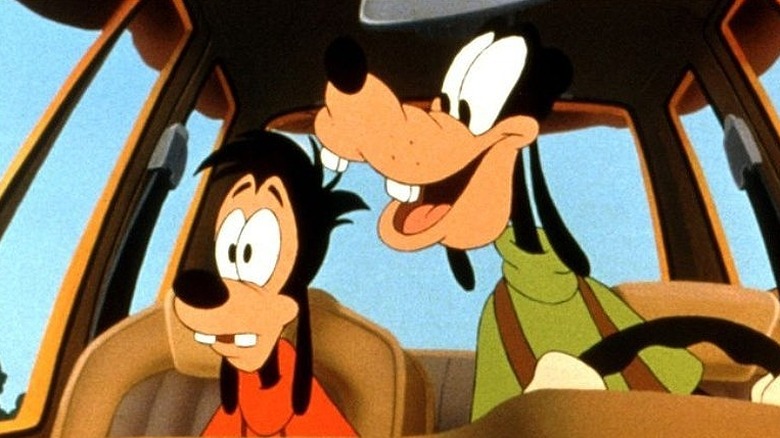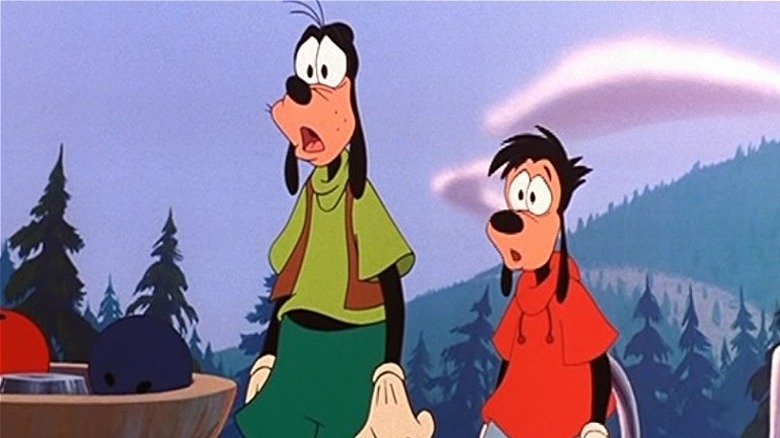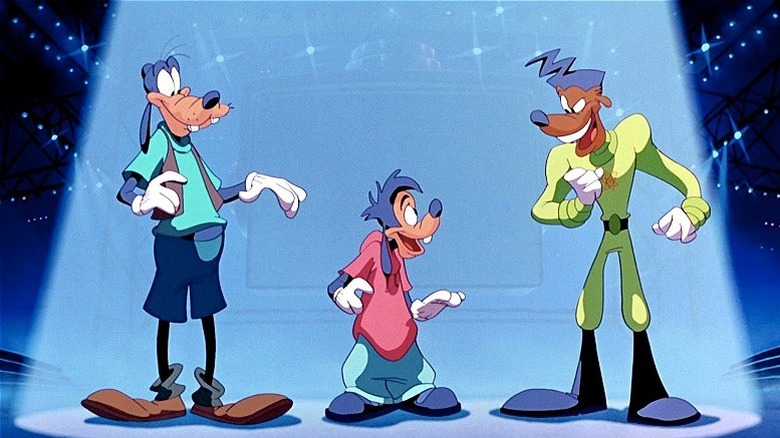A Goofy Movie Originally Planned To Ditch Goofy's Classic Voice
When it comes to iconic Disney animated characters, Goofy comes up a few notches below Donald Duck and Mickey Mouse. Those two saw massive popularity early on in the company's lifespan, and even got to lead theatrical movies like 1944's "The Three Caballeros" with Donald, or Mickey starring in the "Sorcerer's Apprentice" episode of the 1940 film "Fantasia." Goofy's appeal was different, less wide-ranging, and more eccentric than a perpetually exasperated duck or a blandly kind mouse. You couldn't even tell what species he was, although his longtime voice actor Bill Farmer claims he is a dog.
Goofy eventually did get to lead a theatrical film, although several decades after his 1932 debut. The character was best known for Disney shorts those days, and for his cartoony antics in them. As you could guess from his name, he was careless and clumsy, and his oblivious goofball shtick would often result in wildly elaborate slapstick. By 1995, that had mostly changed. "A Goofy Movie" would have a new take on the character, and put him in a solidly realistic world.
For a movie about a ridiculous character, one who seemed immune to pathos, it was nuanced and surprisingly emotional. The movie ended up being unique, touching, and downright legendary, words that few would use to describe the folksy, inelegant Goofy.
The mix of Goofy's ridiculousness and the emotional foundation of the movie is why it works as well as it does. But Disney originally decided to tone Goofy down, going so far as to direct voice actor Bill Farmer to ditch his familiar take on the character in favor of something more normal.
Not just a goof
Goofy's rise to prominence as a character converged neatly with Bill Farmer taking over his voice in 1987. Besides showing up in the classic 1988 cartoon-themed noir "Who Framed Roger Rabbit," Goofy became the subject of a 1992 film Saturday morning cartoon series, "Goof Troop," that played off Goofy's familiar silliness in the context of a suburban sitcom.
The show dealt with Goofy (Farmer) and his normal, more serious-minded preteen son Max (Dana Hill) moving to the small town of Spoonerville. Their house ends up being right next to the standard Disney animated heel Pete (Jim Cummings), repurposed here as a sleazy used car salesman, whose son PJ (Rob Paulsen) becomes fast friends with Max. While much of the show is filling out the cartoon town with funny one-offs and wacky characters, the dynamic between those four is at the center of most episodes. It would be at the center of "A Goofy Movie" as well.
The movie aged up Max (Jason Marsden) so that he could be a teenager, turning the cartoony conflicts between him and Goofy into something more realistic. A teenage boy trying to forge his own identity and escape from the shadow (and embarrassment) of his dad? A low-stakes road movie about the two reconnecting? Goofy and Pete having a difficult conversation about fatherhood in a hot tub? Put it all together and it sounds more like a drama than an animated Disney movie from the company's golden age, although it still climaxes with the characters crashing a concert by the Prince/Michael Jackson-esque popstar Powerline.
The moments of low-key emotional complexity show the untold depths of Farmer's performance. Even though he still sounds like Goofy.
The voice
When production on "A Goofy Movie" began, many questions were raised about the voice, and just how goofy Goofy should sound. The character's light country bumpkin vibe was always accentuated by the voice, the way he says "gawrsh" and "a-hyuck," the melodic quality that plays perfectly with the chaos his clumsiness creates. Bill Farmer was a master of that voice, which would ultimately be proven with "A Goofy Movie." But early on, Disney wasn't even sure they would hire Farmer.
The movie's success would eventually defy all of Disney's expectations, but at the time the studio, as led by Jeffrey Katzenberg, saw it as a cheap way to cash in on the success and prominence of "Goof Troop." Per Vanity Fair, director Kevin Lima had to fight for Farmer to keep the role of Goofy, even as Katzenberg envisioned a marquee name like Steve Martin taking it on. From there, efforts were made to trim Farmer's take on the character, some coming from Katzenberg. According to the AV Club, Farmer was asked to play Goofy as a regular human.
For as low-key as the movie is, that would have been disastrous. And Farmer was aware of that. Besides feeling sentimental about the character being torn too far from his original intention, he was concerned about the character becoming too human and losing the special cartoony quality that made him Goofy.
As he said in the AV Club interview, the process was "tough to go through because I thought they might be changing Goofy too much."
Hearing Goofy
Disney moved forward with the human voice for Goofy despite Bill Farmer's objections. As he recalled during a panel for the movie's 20th anniversary, he was using the normal human voice for Goofy for about a week of recording. As he dejectedly told the film's director Kevin Lima, "nobody wants to hear 'gawrsh' or 'howdy' in my voice ... They want to hear Goofy, don't they?"
At some point after that week, Disney changed course, ultimately choosing to follow through on Farmer's request to play Goofy with the traditional voice. That was lucky for the movie, because it already humanized Goofy as much as it possibly could. Keeping him cartoony in one aspect lets the movie's flights of fancy coexist beautifully with its sensitive, emotional story.
And Farmer is great in the film, getting the perfect mix of Goofy the cartoon character and Goofy the single father who's lost touch with his kid. That particular mix had to be difficult to find, on the part of the filmmakers and Farmer. As he mentioned during the panel, "generally you do three or four days principal recording and a few days of pickup on a movie." Even discounting the lost week of Farmer using a human voice for Goofy, Farmer claims he was recording for 43 days. In the process, he found the mix.
As would be expected given its tighter budget, the movie was more or less dumped by Disney on release. Over time, it became something of a cult classic, a low-key antidote to the splashy musicals for which Disney had become known at the time. And without Farmer's performance, it's easy to imagine it being forgotten.



